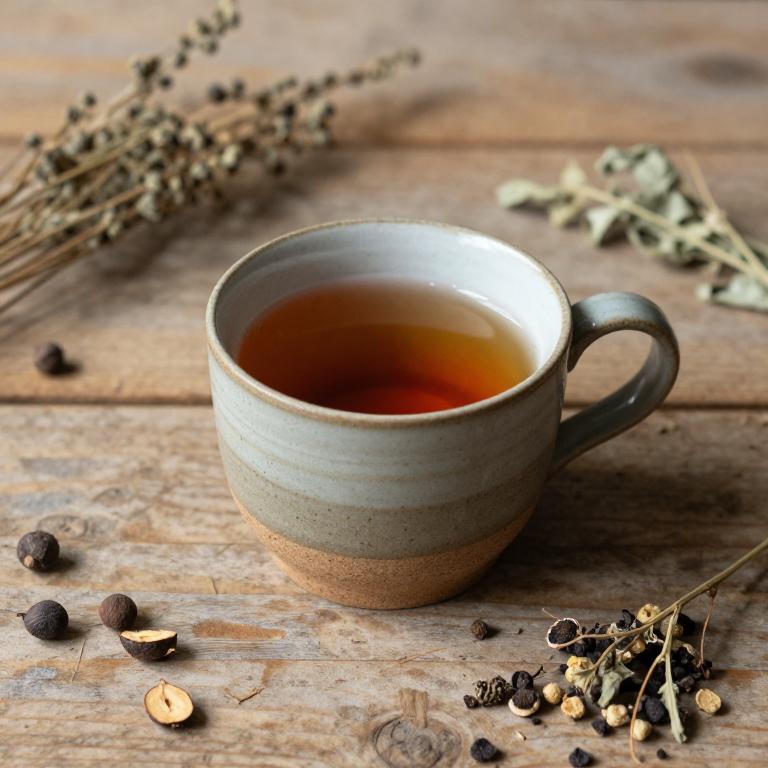10 Best Herbal Teas For Back Pain

Herbal teas can be a natural and soothing remedy for back pain, offering a gentler alternative to pharmaceutical treatments.
Certain herbs such as ginger, chamomile, and willow bark are known for their anti-inflammatory and pain-relieving properties. These teas work by promoting relaxation, reducing muscle tension, and improving circulation in the affected areas. Drinking herbal tea regularly may help alleviate chronic back pain when combined with other therapeutic practices like exercise and posture adjustments.
However, it is important to consult with a healthcare provider before using herbal remedies, especially if you have existing medical conditions or are taking other medications.
Table of Contents
- 1. Salvia (Salvia officinalis)
- 2. Field horsetail (Equisetum arvense)
- 3. Stinging nettle (Urtica dioica)
- 4. St. john's wort (Hypericum perforatum)
- 5. Ceylon cinnamon (Cinnamomum zeylanicum)
- 6. Blessed thistle (Cnicus benedictus)
- 7. Chaste tree (Vitex agnus-castus)
- 8. Chamomile (Matricaria chamomilla)
- 9. Common grape (Vitis vinifera)
- 10. Camellia (Camellia sinensis)
1. Salvia (Salvia officinalis)

Salvia officinalis, commonly known as sage, has been traditionally used in herbal teas to support overall wellness, including relief from back pain.
The herb contains anti-inflammatory and analgesic compounds that may help reduce inflammation and soothe muscle tension in the lower back. When brewed into a tea, sage can be consumed regularly to promote gradual relief and improve mobility. However, it is important to consult with a healthcare professional before using sage tea, especially for chronic or severe back pain.
While sage tea may offer complementary benefits, it should not replace conventional medical treatments for persistent back issues.
2. Field horsetail (Equisetum arvense)

Equisetum arvense, commonly known as field horsetail, has been traditionally used in herbal teas to support relief from back pain due to its high concentration of silica and other anti-inflammatory compounds.
The silica content in horsetail is believed to strengthen connective tissues, potentially improving joint and spinal health. When brewed into a tea, the plant's natural compounds may help reduce inflammation and stiffness associated with musculoskeletal discomfort. However, it is important to note that while some studies suggest potential benefits, more research is needed to fully confirm its efficacy for back pain.
As with any herbal remedy, it should be used under the guidance of a healthcare professional, especially for those with existing health conditions or taking other medications.
3. Stinging nettle (Urtica dioica)

Urtica dioica, commonly known as stinging nettle, has been traditionally used in herbal teas to support overall health, including relief from back pain.
The plant contains anti-inflammatory compounds such as flavonoids and antioxidants that may help reduce inflammation and muscle tension in the lower back. When brewed into a tea, stinging nettle is believed to promote circulation and ease discomfort associated with conditions like arthritis or muscle strain. However, it is important to consult a healthcare professional before using it, especially if you have existing medical conditions or are taking medications.
While some people find relief from regular consumption of nettle tea, results can vary, and it should not replace conventional treatments for chronic back pain.
4. St. john's wort (Hypericum perforatum)

Hypericum perforatum, commonly known as St. John's Wort, is a herbal remedy that has been traditionally used for its potential anti-inflammatory and analgesic properties.
While it is well-known for its use in treating mild to moderate depression, some studies suggest it may also offer relief for certain types of back pain, particularly when inflammation is a contributing factor. The active compounds in St. John's Wort, such as hypericin and hyperforin, are believed to influence neurotransmitters and reduce pain signals in the body. However, it is important to note that its effectiveness for back pain varies among individuals and should be used under the guidance of a healthcare professional.
As with any herbal remedy, St. John's Wort can interact with medications, so caution is advised when incorporating it into a treatment plan for back pain.
5. Ceylon cinnamon (Cinnamomum zeylanicum)

Cinnamomum zeylanicum, commonly known as cinnamon, has been traditionally used in herbal teas to support overall wellness, including缓解 back pain.
The essential oils in cinnamon possess anti-inflammatory and analgesic properties that may help reduce muscle tension and inflammation in the back. When brewed into a warm herbal tea, cinnamon can promote relaxation and ease discomfort associated with chronic or acute back pain. Some studies suggest that the antioxidants in cinnamon may contribute to pain relief by reducing oxidative stress in the body.
However, while cinnamon tea may offer supportive benefits, it should not replace professional medical advice or treatment for persistent back pain.
6. Blessed thistle (Cnicus benedictus)

Cnicus benedictus, commonly known as St. Benedict's thistle, has been traditionally used in herbal medicine for its potential anti-inflammatory and pain-relieving properties.
Herbal teas made from this plant are often recommended for individuals suffering from back pain due to their ability to reduce inflammation and muscle tension. The active compounds in Cnicus benedictus may help alleviate discomfort by supporting the body's natural healing processes. While scientific research on its efficacy for back pain is limited, many users report positive effects when consuming regular doses of the tea.
As with any herbal remedy, it is advisable to consult a healthcare professional before use, especially for those with existing health conditions or taking other medications.
7. Chaste tree (Vitex agnus-castus)

Vitex agnus-castus, commonly known as chasteberry, is an herbal remedy that has been traditionally used to support hormonal balance and alleviate symptoms of various conditions.
While it is often associated with menstrual health and fertility support, some studies suggest it may also have potential benefits for reducing inflammation and muscle tension, which can contribute to back pain. Herbal teas made from vitex agnus-castus are typically consumed as a calming infusion, and they may help ease discomfort by promoting relaxation and reducing stress-related muscle strain. However, it is important to note that more clinical research is needed to fully understand its effectiveness for back pain specifically.
As with any herbal supplement, it is advisable to consult a healthcare professional before use, especially if you have underlying medical conditions or are taking other medications.
8. Chamomile (Matricaria chamomilla)

Matricaria chamomilla, commonly known as chamomile, is a popular herbal tea often used for its calming and anti-inflammatory properties.
While it is widely recognized for its soothing effects on the mind and digestive system, some studies suggest that chamomile may also provide relief for mild back pain due to its potential anti-inflammatory and muscle-relaxing effects. The essential oils in chamomile, such as bisabolol and chamazulene, are believed to reduce inflammation and ease muscle tension, which can contribute to alleviating discomfort in the lower back. However, it is important to note that chamomile should not replace professional medical treatment for chronic or severe back pain.
As a natural remedy, chamomile tea can be a helpful complementary therapy when used alongside other treatments recommended by healthcare providers.
9. Common grape (Vitis vinifera)

Vitis vinifera, commonly known as the common grape vine, has been traditionally used in herbal medicine for its potential health benefits, including relief from back pain.
The leaves and seeds of the Vitis vinifera plant contain compounds such as resveratrol and flavonoids, which possess anti-inflammatory and analgesic properties. Herbal teas made from these parts are believed to help reduce inflammation and muscle tension in the lower back, offering a natural alternative for those seeking pain relief. While scientific research on its effectiveness for back pain is limited, many users report positive effects when consuming Vitis vinifera tea regularly.
As with any herbal remedy, it is advisable to consult a healthcare professional before use, especially for individuals with chronic or severe back pain.
10. Camellia (Camellia sinensis)

Camellia sinensis, the plant from which green and black teas are derived, contains compounds like polyphenols and catechins that may help reduce inflammation and muscle tension, potentially offering relief for back pain.
While not a cure for chronic back pain, herbal teas made from Camellia sinensis may support overall musculoskeletal health due to their antioxidant and anti-inflammatory properties. Some studies suggest that regular consumption of these teas could improve circulation and reduce oxidative stress, which are often linked to pain and discomfort. However, it is important to note that Camellia sinensis teas should be used as a complementary therapy rather than a standalone treatment for back pain.
Individuals with sensitive stomachs or those on medications should consult a healthcare professional before incorporating these teas into their routine.